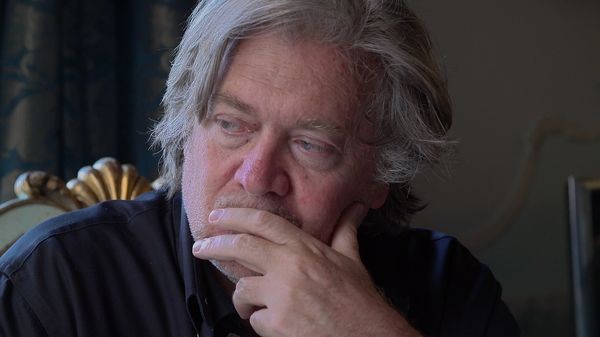Eye For Film >> Movies >> The Brink (2019) Film Review
The Brink
Reviewed by: Jennie Kermode

Steve Bannon is not a man who believes in bad publicity. Even now, as the Trump regime teeters on the brink of coming undone, he's looking for new opportunities, building his own brand - a brand many people consider too toxic but, nevertheless, one that sells. After all, in a world where finance ministers who have wrecked economies frequently get top banking jobs and actors who need earpieces to pipe in lines they're too drunk to remember still get major roles, it's often the fame that counts. Watching Alison Klayman's documentary, one cannot help but feel that Bannon sees it as a tool to this end. The question is, can Klayman tease out insight that make it into something more?
Between 2017 and 2018, she spent a year embedded with the right wing spin doctor as he travelled around the world trying to unite what he saw as similarly positioned movements in a variety of countries. She travelled in his private jets, sat in on any number of strategy meetings and watched him lose his temper with endless distracting phone calls and the incompetence of underlings (something any number of people in politics or business will relate to). It's difficult to maintain a performance over this length of time and Bannon doesn't seem as if he's trying to. Rather, he comes across as someone who has cultivated a useful persona to the point where he's now living it for real. When annoyed, he actually uses the term fricking. His ruffled hair and rumpled shirts are always ruffled and rumpled in the same way, a once-planned, now habitual distraction.
Editing is the best tool that Klayman has at her disposal. Led by Brian Goetz, it draws out common themes and strands from the vast web of footage she accumulated. Over a year, the little tricks and supposedly spontaneous remarks that operators like Bannon use for colour and camouflage can't help but be repeated. early on, we see Bannon position a woman for a photograph with himself on one side of her, another man on the other, and refer to her as "a rose between thorns", a remark which may seem flattering until contextualised by a later sequence which seems him use the same line over and over again. At another point, as he encourages aides to formulate a marketing campaign, women are referred to as one of the "small groups" which can be targeted, as if being female were a niche interest. These little moments undermine the charm, showing the calculations at work, providing little hints of the beliefs that lie behind them.
In other scenes, Bannon almost seems to be testing himself, seeing just how far he can go before reeling back to present himself as reasonable, respectable, not quite ready to trivialise the Holocaust, just skirting close enough to that to keep people interested in what he might say next. Is he deliberately provoking Klayman? Is he playing with the audience? Is he pushing at the boundaries of the space he has created in order to reassure himself that he's still in control?
There are a lot of big numbers in this film, big money changing hands. Exactly what the billionaires being courted receive in exchange for their donations is unclear. Meetings take place in elegant hotels. In one moment, Bannon stands in front of a handsome gilt-framed painting pontificating about the future of Europe. Everywhere somehow acquires a tawdry character in his presence, as if the sky turns grey and stains creep up the walls especially for him. His gameplay is sharp but it's built on layer upon layer of theory. He doesn't seem to have any real sense of where he is, and he's sometimes shockingly naive. At one point Klayman asks him what it is about his aims that has made them worth he sacrifice of his personal life. He briefly stumbles as if not sure what he's supposed to say. It's as close as we get to something that might be his original personality, or absence thereof.
Throughout the film, Bannon is keen to tell us what he's not. We hear remarkably little about what he is. Whilst one cannot imagine that the film provides quite the propaganda he might have hoped for, understanding the subtlety of what Klayman has created requires a type of empathy that it's not clear he possesses, and it's quite possible that his supporters will miss its critique. We meet one woman here who, on hearing that he's going to be speaking, becomes tremendously excited and gushes about how much she adores him. He makes an unlikely heartthrob. Is it about hate? People like to be given permission to hate, Klayman suggests. Bannon prefers to talk about anger. Perhaps it seems easier to justify.
Reviewed on: 08 Nov 2019
















